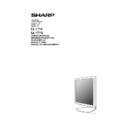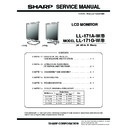Sharp LL-171A (serv.man2) User Manual / Operation Manual ▷ View online
29
English
Deutsch
Fran
ç
ais
Italiano
Espa
ñ
ol
English
Installing set-up information and the ICC profile (For Windows)
For Windows 2000
Installing monitor set-up information into
Windows 2000, and setting the monitor's ICC
profile as a predetermined value.
This explanation assumes that the CD-ROM drive
is "D" drive.
Windows 2000, and setting the monitor's ICC
profile as a predetermined value.
This explanation assumes that the CD-ROM drive
is "D" drive.
1. Load the accessory CD-ROM into the CD-ROM
drive of the computer.
2. Click on the [Start] button. From [Settings],
choose [Control Panel].
3. Double click on [Display].
4. Click on [Settings], [Advanced] and [Monitor].
5. Click on [Properties], [Driver] and [Update
4. Click on [Settings], [Advanced] and [Monitor].
5. Click on [Properties], [Driver] and [Update
Driver].
6. When [Upgrade Device Driver Wizard]
appears, click [Next].
7. Check [Display a list of the known drivers for
this device so that I can choose a specific
driver] and click [Next].
driver] and click [Next].
8. When [Models] is displayed, click on [Have
disk], confirm that [Copy manufacturer's files
from:] is [D:], and click [OK].
from:] is [D:], and click [OK].
9. Select the monitor from the list displayed and
click [Next].
10. Click [Next], confirm that the monitor's name
appears on the screen, and click [Finish]. If
[The Digital Signature Not Found] appears,
click [Yes].
[The Digital Signature Not Found] appears,
click [Yes].
11. Click on [Close].
12. Click [OK], and close the window.
12. Click [OK], and close the window.
For Windows Me
Installing monitor set-up information into Windows
Me, and setting the monitor's ICC profile as a
predetermined value.
This explanation assumes that the CD-ROM drive
is "D" drive.
Me, and setting the monitor's ICC profile as a
predetermined value.
This explanation assumes that the CD-ROM drive
is "D" drive.
If the "Add New Hardware Wizard" has appeared:
1. Load the accessory CD-ROM into the CD-ROM
1. Load the accessory CD-ROM into the CD-ROM
drive of the computer.
2. Check [Specify the location of the driver
[Advanced]] and click [Next].
3. Check [Display a list of all the drivers in a
specific location, so you can select the driver
you want.], then click [Next].
you want.], then click [Next].
4. When [Models] is displayed, click on [Have
disk], confirm that [Copy manufacturer's files
from:] is [D:], and click [OK].
from:] is [D:], and click [OK].
5. Select the monitor details from the list, then
click [Next], [Next], and [Finish]. If the "Add New
Hardware Wizard" appears, repeat the
installation commands beginning from 2
above.
Hardware Wizard" appears, repeat the
installation commands beginning from 2
above.
If the "Add New Hardware Wizard" has not
appeared:
1. Load the accessory CD-ROM into the CD-ROM
appeared:
1. Load the accessory CD-ROM into the CD-ROM
drive of the computer.
2. Click on the [Start] button. From [Settings],
choose [Control Panel].
3. Double click on [Display].
4. Click on [Settings], [Advanced] and [Monitor].
5. In [Options], check [Automatically detect Plug &
4. Click on [Settings], [Advanced] and [Monitor].
5. In [Options], check [Automatically detect Plug &
Play monitors] and click on [Change].
6. Check [Specify the location of the driver
[Advanced]] and click [Next].
7. Check [Display a list of all the drivers in a
specific location, so you can select the driver
you want.] and click [Next].
you want.] and click [Next].
8. When [Models] is displayed, click on [Have
disk], confirm that [Copy manufacturer's files
from:] is [D:], and click [OK].
from:] is [D:], and click [OK].
9. Select the monitor details, then click [Next],
[Next], and [Finish].
10. Check that the monitor details are displayed,
then click [Apply].
11. Click [OK], and close the window.
171AG_gb.P65
12/4/2003, 1:14 PM
29
30
For Windows XP
Installing monitor set-up information into Windows
XP, and setting the monitor's ICC profile as a
predetermined value.
This explanation assumes that the CD-ROM drive
is "D" drive.
XP, and setting the monitor's ICC profile as a
predetermined value.
This explanation assumes that the CD-ROM drive
is "D" drive.
1. Load the accessory CD-ROM into the CD-ROM
drive of the computer.
2. Click on the [Start] button. Choose [Control
Panel].
3. Switch to "Classic View".
4. Double click on [Display].
5. Click on [Settings], [Advanced] and [Monitor].
6. Click on [Properties], [Driver] and [Update
4. Double click on [Display].
5. Click on [Settings], [Advanced] and [Monitor].
6. Click on [Properties], [Driver] and [Update
Driver].
7. When [Hardware Update Wizard] appears,
check [Install from a list or specific location
[Advanced]] and click [Next].
[Advanced]] and click [Next].
8. Check [Don't search. I will choose the driver to
install.] and click [Next].
9. Click on [Have Disk], confirm that [Copy
manufacturer's files from:] is [D:], and click [OK].
10. Select the monitor from the list displayed and
click [Next].
If [has not passed Windows Logo testing...]
appears, click [Continue Anyway].
If [has not passed Windows Logo testing...]
appears, click [Continue Anyway].
11. Confirm that the monitor's name appears on
the screen.
12. Click on [Finish].
13. Click on [Close].
14. Click [OK], and close the window.
13. Click on [Close].
14. Click [OK], and close the window.
Installing the ICC profile
Installing the monitor's ICC profile. (If the set-up
information has already been installed, so too has
the profile, and there is no need to install it.)
This explanation assumes that the CD-ROM drive
is "D" drive.
information has already been installed, so too has
the profile, and there is no need to install it.)
This explanation assumes that the CD-ROM drive
is "D" drive.
1. Load the accessory CD-ROM into the CD-ROM
drive of the computer.
2. Click on the [Start] button. From [Settings],
choose [Control Panel].
3. Double click on [Display].
4. Click on [Settings] and [Advanced].
5. Click on [General] and from [Compatibility]
4. Click on [Settings] and [Advanced].
5. Click on [General] and from [Compatibility]
select [Apply the new display setting without
restarting], then click on [Color Management].
restarting], then click on [Color Management].
6. Click [Add], and select CD-ROM as the file
location.
7. Choose the color profile that you would like to
install, and click on [Add].
8. Choose the profile and click on [Set As
Default].
9. Click [OK], and close the window.
- When using the ICC profile, set as follows:
- [DISPLAY MODE]: [STD] or [OFFICE]
- [WHITE BALANCE]: [STD]
- [GAMMA]: [0]
- [WHITE BALANCE]: [STD]
- [GAMMA]: [0]
Installing set-up information and the ICC profile (For Windows)
171AG_gb.P65
12/4/2003, 1:14 PM
30
31
English
Deutsch
Fran
ç
ais
Italiano
Espa
ñ
ol
English
Information about the ColorSync profile (For MacOS)
About the ColorSync profile
ColorSync is Apple Computer's color management
system and enables color reproduction
characteristics to be realized when used with a
compatible application. A ColorSync profile
describes the color characteristics of the LCD
monitor.
ColorSync is Apple Computer's color management
system and enables color reproduction
characteristics to be realized when used with a
compatible application. A ColorSync profile
describes the color characteristics of the LCD
monitor.
Notes:
- This monitor's ColorSync profile works with
- This monitor's ColorSync profile works with
MacOS 8.5 or above.
- When using the ColorSync profile, set as
follows:
- [DISPLAY MODE]: [STD] or [OFFICE]
- [WHITE BALANCE]: [STD]
- [GAMMA]: [0]
- [DISPLAY MODE]: [STD] or [OFFICE]
- [WHITE BALANCE]: [STD]
- [GAMMA]: [0]
Setting up the ColorSync profile
Notes:
- It is necessary to have PC Exchange or File
- It is necessary to have PC Exchange or File
Exchange installed in your system.
- Depending on the type of computer or OS,
command names and methods may differ.
Please follow the computer's own operation
manual while reading this.
Please follow the computer's own operation
manual while reading this.
1. Load the accessory CD-ROM into the CD-ROM
drive of the computer.
2. Copy the profile to be used from the CD-ROM to
the ColorSync profile folder in the system folder.
3. Using the ColorSync on the control panel,
choose the profile to be used.
171AG_gb.P65
12/4/2003, 1:14 PM
31
32
Instructions for attaching a VESA-compliant arm
An arm or stand based on the VESA standard
(commercially available) can be attached to the
monitor. Procurement of the arm or stand is at the
customer's discretion.
(commercially available) can be attached to the
monitor. Procurement of the arm or stand is at the
customer's discretion.
Arms or stands able to be used
Attachments must satisfy the following.
- Compatible with the VESA standard.
- Have a gap of 100 mm x 100 mm between the
- Compatible with the VESA standard.
- Have a gap of 100 mm x 100 mm between the
screw holes on the section to be attached.
- Not be likely to fall off or break off after being
attached to the monitor.
How to attach the arm or stand
- Be careful not to over bend the cable or add
extension cords as this could lead to malfunction.
- While following these instructions, please also
refer to the installation instructions in the
operation manual included with the arm or stand.
operation manual included with the arm or stand.
CAUTION!
- Be careful not to get your fingers pinched
between the display and stand nor to let the
stand drop. These could lead to injury.
stand drop. These could lead to injury.
1. Remove the cables.
2. Spread out a soft cloth on a suitable horizontal
2. Spread out a soft cloth on a suitable horizontal
surface.
3. Being careful not to damage the monitor, gently
lay the monitor on it display-side down.
- For the LL-171G, extend the stand as long as
- For the LL-171G, extend the stand as long as
possible and lock it before positioning the
monitor. (p.11)
monitor. (p.11)
4. Remove the four screws and then remove the
stand from the monitor.
Notes:
- The stand is specially made for use with this
- The stand is specially made for use with this
monitor. Once having removed the stand, never
attempt to attach it to another device.
attempt to attach it to another device.
- Once having removed the screws, store them
together with the stand and if the stand is ever
re-attached be sure to use the original screws.
Using different screws could lead to a malfunction.
re-attached be sure to use the original screws.
Using different screws could lead to a malfunction.
[LL-171G]
[LL-171A]
5. Attach the arm to the monitor with the four screws.
Note:
- The screws used to attach the arm should be M4
- The screws used to attach the arm should be M4
screws with a length of 4 - 5 mm protruding from
the surface to be attached. Using different
screws could cause the monitor to fall off or to be
internally damaged.
the surface to be attached. Using different
screws could cause the monitor to fall off or to be
internally damaged.
CAUTION!
Do not disassemble the stand. Parts may
spring out and cause injury.
Do not disassemble the stand. Parts may
spring out and cause injury.
CAUTION!
Store the stand of the LL-171G in its most
extended position.
When the stand is stored in a contracted
state, the lock may accidentally release
and the stand may abruptly extend,
causing injury.
Store the stand of the LL-171G in its most
extended position.
When the stand is stored in a contracted
state, the lock may accidentally release
and the stand may abruptly extend,
causing injury.
Screw used to attach arm
Arm
Part of monitor to which arm is
attached
Part of monitor to which arm is
attached
171AG_gb.P65
12/4/2003, 1:14 PM
32



